Posts Tagged ‘TV reviews’
“Billions” thoughts, Season Two, Episode Nine: “Sic Transit Imperium”
April 18, 2017Bobby Axelrod’s personal fortune would shame a Roman emperor’s. Shouldn’t his memento mori be equally upscaled? “Sic Transit Imperium,” this week’s episode of Billions, begins with his right-hand man Wags’s delivery of a birthday present: “The Arc,” a secure facility for billionaire survivalists and their families to hole up in the event of armageddon. The key comes in the shape of a fake Roman coin, “So goes the Empire” written on one side. L’état, c’est Axelrod—if he goes, the world goes with him.
But the episode ends with Bobby declining the gift. “I’LL NEVER ACCEPT THIS” reads the note that accompanies the coin-key he sends back to Wags in lieu of attending his own birthday party. The idea is that Bobby sees through it all. Sure, he’s obligated to do at least a little pro forma legacy-building and image-burnishing, as he does when he hires a “stuffed shirt” to direct his charitable efforts to the tune of $500K a year. But a lavish birthday party where his loyal subjects pay him homage and celebrate all they’ve built together? A luxury doomsday bunker so he can ride out the apocalypse in style? Avoiding a sure thing involving a soon to be scandal-plagued car company over paltry, mortal-human concerns like “it’s illegal” and “the tip comes from an ex-employee with an act to grind”? The hell you say! Attempts to ensure a smooth and safe future are a waste of his time and talent. As he says to Taylor in one of the episodes many surprisingly sincere exchanges, “The moral of the story is you get one life, so do it all.” Sic transit imperium can take a back seat to carpe diem.
I reviewed this week’s Billions for the New York Observer. I have no idea if people are watching this show this season or what, particularly in what is by now one of the most crowded fields for good tv in as long as I’ve been doing this—at some point or other during the season’s run it will have competed for attention with Big Little Lies, Girls, The Americans, Taboo, The Leftovers, Harlots, Better Call Saul, Feud, Veep, Legion, American Crime, American Gods, The Handmaid’s Tale, Fargo, a tonal and qualitative mixed bag to be sure but all of them serious efforts—but boy did it get good.
A Guide to All “The Leftovers”‘ Theories About the Departure
April 15, 2017We’ll never know what caused the Sudden Departure, the instantaneous disappearance of 2 percent of the world’s population at the center of HBO’s critically acclaimed drama The Leftovers. Series co-creator Damon Lindelof has said so, repeatedly, and if anyone knows the danger of promising answers he’s in no position to deliver, it’s the guy who did Lost. It’s a smart move, too. By taking “What happened?” off the table, it leaves the show free to explore a far more open-ended and rewarding question: “What happens next?”
But here’s the thing. We in the audience may know that the Sudden Departure will always be an unsolved mystery, but the people in the world of the show itself sure don’t. Much of The Leftovers is driven by the theories, belief systems, religious doctrines, mystical mumbo-jumbo, and out-and-out nihilism embraced by its various characters to explain the world-changing event and give life meaning afterward. Below, you’ll find the major schools of thought through which the people of The Leftovers attempt to understand their weird world.
A “Leftovers” Refresher: Every Last Thing to Remember for the Final Season
April 13, 2017Kevin Garvey (Justin Theroux)
Kevin is the handsome, brooding, handsome, mentally ill, handsome, dead and resurrected, and last but not least, handsome patriarch of the fractious Garvey family. Kevin served as the chief of police in the sleepy New York suburb of Mapleton, a job he inherited along with a genetic predisposition to schizophrenia from his father, Kevin Sr. (Scott Glenn, whose character is currently holed up in Australia). Kevin’s “is it real, is it supernatural, or is it a hallucination?” visions and misadventures have driven much of the show’s action.At the moment of the Departure, Kevin was cheating on his wife Laurie in an impulsive one-afternoon stand; his lover disappeared from their motel bed. During season one, the increasingly unstable family man and a local gun nut named Dean graduate from shooting stray dogs to kidnapping Patti Levin (Ann Dowd), the local leader of the Guilty Remnant cult. When she kills herself in front of him, he covers up her death, comes clean months later, and is told not to sweat it by the government, which in The Leftovers’ world has very little problem at all with the murder of cult members. This is cause for concern, since all three members of the family Kevin had before the Sudden Departure have done time in cults themselves: His ex-wife, Laurie, joined the Guilty Remnant and eventually helped recruit their daughter, Jill, while his adopted son, Tommy, took up with the British healer and harem-keeper known as Holy Wayne.
By the start of season two, all three have left their cults, but only Jill remains with Kevin. They’re joined by Lily, the infant daughter of Holy Wayne and one of his many ersatz wives, a young woman named Christine, left on the family doorstep by Tommy. Together with his new girlfriend Nora Durst, whose loss during the Sudden Departure was catastrophic, they move to the town of Jarden (see above). While there, his dissociative sleepwalking episodes lead him to attempt suicide in the same water where three local teens disappear that very night. Guilt-ridden and cracking up, he’s also literally haunted by Patti, who is either a hallucination or an actual ghost. (The Leftovers isn’t big on answering such questions.)
In order to purge himself of Patti, Kevin poisons himself with the help of a local shaman (more on him later) and travels to a purgatorial “other place” — a luxury hotel where, in the guise of an international assassin, he stalks and kills an alternate version of Patti who’s running for president. He then learns that her “real” self in this world is a little girl, whom he pushes down a well before falling in himself to finish the job. Once resurrected in the real world, he winds up getting shot by the father of the disappeared girl (again, more on him later), travels back to the hotel purgatory, and escapes by singing Simon and Garfunkel’s “Homeward Bound” at karaoke. Season two ends with Kevin and his whole big crazy extended family reunited.
“The Path” thoughts, Season Two, Episode Thirteen: “Mercy”
April 13, 2017Eddie Lane has been anointed the Guardian of the Light, but the burden sits uneasily on his shoulders. Cal Roberts remains in charge of the Meyerist movement, but his emotional instability ensures that his grasp on power is a shaky one. Sarah Lane’s feelings toward both men exist are a paralyzing maelstrom of love, loyalty, and loathing. Her family, themselves members of the Meyerist inner circle, send her conflicting messages about where their own loyalties lie. The other major players in the movement have been momentarily marginalized, yet still seem capable of shifting their support from one leadership candidate to another should circumstances warrant. Eddie and Sarah’s children Hawk and Summer, the former in particular, are caught in the emotional and ideological crossfire. FBI Agent Abe Gaines is a man without a country as his undercover investigation into the movement causes him to question his personal and professional priorities. And the fate of a small town called Clarksville, its water supply poisoned by a corporate polluter, hangs in the balance as the Meyerists hash out their legal, political, and financial future. Yes, the Season Two premiere of The Path has — I’m sorry, I’m <puts finger on earpiece> I’m now being told that this was the Season Two finale of The Path? Did I get my notes mixed up or something?
Upon further review, the answer, unfortunately, is no. “Mercy,” the final episode of The Path’s maddeningly meandering second season, returns us pretty much exactly to where it started. Sure, the show may have added a dozen or so Deniers, now that Eddie has kinda-sorta accepted his role as a potential leader for a Meyerist reform movement, and subtracted one Richard, who lit himself on fire in what turned out to be an entirely unsuccessful attempt to shake the corrupted faith to its foundations. Other than that, though? It’s like the intervening twelve episodes never happened. All those changes of heart and reversals, all that business about blackmail and Clarksville, the very existence of Kodiak and Chloe (remember them?), the constant stream of Seinfeld pop-ins (for god’s sake, Abe pops in on Eddie and Sarah while they’re fugitives from the law in Canada in this episode) — none of it wound up mattering at all. Cal is twitchy, Sarah is torn, Eddie is facing the world with a grimace, and for all its up-with-people rhetoric Meyerism is a psychological disaster area. Situation normal, all fucked up.
I reviewed the disappointing finale of The Path’s disappointing second season for Decider.
“The Americans” thoughts, Season Five, Episode Six: “Crossbreed”
April 13, 2017It’s weird to spend this much time concerned about Philip, in a way. Even though he’s long been the conscience of the couple—the show began with him trying to persuade Elizabeth to defect, remember?—he’s spent most of the past few seasons worried about others: his duped “wife” Martha, for example, and his daughter Paige most especially. But Paige has worries all her own. I’m still wrestling with that odd scene where she and her mother talk to a Mary Kay sales rep at the front door. Paige seems delighted, but Elizabeth is disgusted, and even if the Mary Kay lady is too seasoned a pro to acknowledge it, that disgust shows. “You weren’t very nice to her,” Paige tells her mom afterward, perplexed. “Well, we weren’t gonna buy anything,” Elizabeth says. “Being nice would just be a waste of her time.” Indictment of how capitalism commodifies time and human relationships and objectifies human beings? Yes, as Paige’s late-night readings of Marx would help her understand. Indictment of her own mother’s instrumentalization of other people based on whether or not they suit the needs of the moment? Also yes, as Elizabeth’s instruction to hide Capital among other books so as not to arouse suspicion from outside observers would help Paige understand in turn. There’s something awfully ugly about that scene, short and subdued and murder-free though it may be.
I reviewed this week’s quietly disturbing episode of The Americans for the New York Observer.
“Better Call Saul” thoughts, Season Three, Episode One: “Mabel”
April 13, 2017The slowness and silence of Mike’s side of the story is a stupendous choice for several reasons. First, it aims the spotlight directly at the facial expressions and body language of Jonathan Banks as Mike. As an actor, he doesn’t perform so much as he oven roasts, slowly and quietly allowing the characters skill, determination, ruthlessness, patience and weariness to flavor his every move. Second, it provides composer Dave Porter with a blank canvas on which to paint an engrossing post-rock musical accompaniment, miles away from the jaunty country-western kitsch of the soundtrack. Third, it gives director Vince Gilligan—working here with cinematographer Marshall Adams—the chance to let the visual dimension do much of the talking. Mike’s sections of the show are basically oceans of darkness, surrounding islands of warm yet sickly yellow glowing light in which Mike moves or sits like a castaway; that yellow color beams “CAUTION” at our brains like the lights from a roadside construction project on a rainy night. It’s a powerful contrast with the black and white of the flash-forward opening sequence, showing Jimmy’s eventual fate as Gene the Omaha Cinnabon manager; with the Office Space aesthetic of Jimmy’s 2002-era material; even with the dark wood paneling and bright “natural” daylight that characterize scenes starring Jimmy’s Luddite brother Chuck. It’s tough to think of a series with as distinct a visual aesthetic as Better Call Saul which is also willing to vary that aesthetic so much in a single episode.
Finally, Mike’s slow and steady story gives lie to the claim that Better Call Saul is becoming Breaking Bad Redux. Perhaps Breaking Bad’s magisterial final season (minus that regrettable punch-pulling finale, of course), which moved toward the destruction of Walter White with the grace and grandeur of the inevitable, makes the chaos of that show harder to remember. But from literally the first scene of the first episode of the first season, Walt’s story showed him careening from one calamity to another, creating new disasters to extricate himself from the old ones nearly every time. Mike’s story may involve Breaking Bad heavies like the Salamanca Family and, presumably, Gus “The Chicken Man” Fring; it may have more in common with that show’s violent stock in trade than the white-collar crimes of Jimmy McGill or the mental illness of his hotshot older brother Chuck; but in pacing and in tone it remains a very different proposition indeed.
I reviewed the season premiere of Better Call Saul for the New York Observer. Eff what you heard about the show getting too close to Breaking Bad; other than the characters and the overall skill involved they have very little in common.
“Billions” thoughts, Season Two, Episode Eight: “The Kingmaker”
April 13, 2017Before we really get into this, I want us to take a moment—you and me, just us two—to talk about David Costabile and Mike “Wags” Wagner.” I want you to think about the way his face crinkles with joy when he learns his boss Bobby Axelrod wants to take on Black Jack Foley, the most powerful man in New York. “Rough him up?” he says, beaming like a kid on Christmas morning. “I’m all for it!” I want you to consider how, when his underling Maffee razzes him for his pathological partying, he not only verbally menaces the guy but raises his leg and puts his foot on his desk while he does it, like a dog about to mark his territory. I want you to savor the way he turns to the brokerage goons who are courting Axe Cap’s business, insists on ditching their boring business dinner for something more…exciting, and fucking says “Fire walk with me” like a David Lynch demon. I want us, you and me, to treasure this man, this character, this performance. He is a delight undeserved, and yet here he is.
That’s more or less the way I feel about Billions in toto. How this show became one of the tightest, smartest, and most entertaining series on television this year is a mystery I don’t think I’ll ever get to the bottom of, but I’m not about to look a gift horse in the mouth. As of “The Kingmaker,” this week’s episode, Billions is serving up a type of tight, aphoristic writing we haven’t seen since Mad Men. It’s not looking to tear your guts out the way Matt Weiner’s classic drama was, (though as we’ll see, it may occasionally do so anyway), but that’s fine. We could all use an unimpeachably written drama about the evil that capitalist men do right about now, don’t you think?
I reviewed this week’s Billions for the New York Observer. I’m just apeshit for this show this season. Never seen a turnaround like it before.
“The Path” thoughts, Season Two, Episode Twelve: “Spiritus Mundi”
April 5, 2017“I’m lost, man,” disgruntled undercover FBI agent Abe Gaines tells disgruntled ex-Meyerist/messiah Eddie Lane at the beginning of this week’s episode of The Path. “I’m in someone else’s story.” He’s not the only one. I have one question for The Path at this point: Why isn’t — excuse me, why wasn’t — Richard the main character?
“The Americans” thoughts, Season Five, Episode Five: “Lotus 1-2-3”
April 5, 2017“I’d like to lay a little bet / That you don’t even know the meaning of regret / And if I’m even just a tiny bit correct / I doubt that you would ever think to pay your debt / I’m suspicious / Suspicious of you.”—Psychic TV, “Suspicious”
“Just because you’re paranoid don’t mean they’re not after you.”—Nirvana, “Territorial Pissings”
“It is worse than a crime, it is a mistake.”—Joseph Fouché, frequently misattributed to Talleyrand
“Lotus 1-2-3,” this week’s episode of The Americans, had me reaching for my mental quote book. (Not many physical ones contain Psychic TV.) It’s hard to narrow down which of the above phrases best encapsulates what went on here, so we’ll take them one by one.
We’ll start with the last, though it’s a quote I’ve always hated. No, actually, a mistake is not worse than a crime. A crime is bad enough in and of itself. This is the sort of blustery self-justifying bullshit that enables bad actors in political conflicts across the centuries to push morality to the side as, if not entirely irrelevant, then at least incidental to the allegedly more important practical considerations. You’ll recognize this mentality from the 2016 presidential debates, perhaps, when Donald Trump responded to a question from a Muslim member of the audience with his usual senile-dementia neofascism about evil Islamic fundamentalists, only for Hillary Clinton, the supposed avatar of American progressivism, to say that no, actually, we need to be good to Muslims…so that they’ll serve as our eyes and ears among the aforementioned evil Islamic fundamentalists. The idea that fomenting Islamophobia is itself evil, that it’s bad in and of itself, that it’s morally wrong and therefore curtailing it requires no practical justification, was nowhere to be found.
This week Philip Jennings shoots this whole way of thinking down with a sardonic facial expression and a flatly incredulous sentence. It turns out that their investigation into American attempts to destroy Soviet crops was completely off-base, and that the virulent strain of midges they’d discovered is being used to make wheat more resistant to pests. This means that the lab tech whose spine he snapped in Kansas for the crime of looking the other way had really done nothing wrong at all. “That guy in the lab,” Philip says to Elizabeth, as they sit wearing the clothes and wigs of fake people in a fake house. “That can’t happen ever again.” “We’ll be more careful,” Elizabeth reassures him. “ ‘More careful’?” he repeats, the look in his eyes and the tone of his voice making his concern and contempt clear. To Philip, who says he’s been having problems with the wetwork they’re required to do for a long time, “careful” doesn’t enter into it. The problem wasn’t that they were sloppy, it’s that they murdered an innocent man. It was worse than a mistake, it was a crime.
“Billions” thoughts, Season Two, Episode Seven: “Indian Four”
April 5, 2017You can’t swing a gatefold Dark Side of the Moon album cover without hitting a TV music cue meant to BLOW YOUR MIND these days. What a joy it was, then, to stumble across a needle-drop on Billions meant to do nothing more and nothing less than make you crack up? The honor goes to “Sex and Candy,” the ‘90s alt-pop staple from Marcy Playground that turned lust into something that sounded sleepy and skeezy and, well, smelly. In that sense, it’s perfect for the sex scene it soundtracked: a poolside oral tryst between the Axelrods’ skeezebag personal chef and his tattooed lady friend. But did Billions start the song when it first cut to these two hardbodies getting it on? Hell no—those first “only ‘90s kids will remember” notes rang out, incongruously and ironically, over Chuck Rhoades and his son Kevin and their football, posing for the all-American photo shoot intended to launch his political career. The moment I recognized it I started literally lol’ing. Deflating Chuck’s pretensions to righteousness and segueing into the show’s filthiest romp so far this season (Wags’s tattooed ass notwithstanding)? Take fucking notes, Legion and Stranger Things—that’s how music direction is done.
And as far as the kind of “the part stands in for the whole” moments that we TV critics can’t get enough of, it’s almost too good to be true. Directed by John freaking Singleton and written by Alice O’Neill and series co-creators Brian Koppelman and David Levien, “Victory Lap” is the episode in which this extraordinarily, improbably entertaining season of Billions rips off the capitalism scab to reveal the exploitation pus beneath.
I reviewed this week’s Billions, maybe the best of its very strong season so far, for the New York Observer. Okay, so Legion was still irritating me, but that aside this had one of the most gut-level upsetting story turns I’ve seen in a long while. Great stuff.
“Legion” thoughts, Season One, Episode Eight
April 5, 2017“Don’t be afraid to care,” advises the Pink Floyd singer-guitarist David Gilmour in the prog-rock titans’ dreamy anthem “Breathe.” It’s a signature track on “The Dark Side of the Moon,” the perpetually best-selling concept album about modern life and mental illness that has soundtracked many a dorm-room bull session and chemically enhanced “Wizard of Oz” screening.
And given the propensity of “Legion” to make subtext text, I probably shouldn’t have been so surprised that the show would use this jaw-droppingly literal music cue for a pivotal scene in its season finale. Why not use a song with the lyric “All you touch and all you see is all your life will ever be” for an astral-plane confrontation in which David Haller’s life literally flashes before his eyes? Why not mesh the lyrics’ fatalistic take on the inescapable nature of death with a sequence in which David discovers how lethal it would be to free himself from the grasp of his nemesis, the Shadow King? Why not cap off a show renowned for its surreal, spacey visuals and structure with a song that comes pre-loaded with four and a half decades of psychedelic nostalgia?
The answer is right there in Gilmour’s line “Don’t be afraid to care.” Creator Noah Hawley and company crafted a show that stood out against its drab and unadventurous superhero peers, to be sure, and maybe that’s good enough. But it could have been great with a little more willingness to avoid the obvious, to go for magic rather than parlor tricks, to not use one of the most famously trippy songs in the history of rock ’n’ roll to tell the audience, “Wow, man — trippy, isn’t it?” A little more care is exactly what this episode, and the show in general, really needed.
I reviewed the season finale of Legion for the New York Times last week. I didn’t like the finale, or the season. I’ve seen semi-convincing arguments that the show is enjoyable when looked at as a silly fun superhero show with some unusual visual flair, but as that’s neither how it was sold nor, quite clearly, what its creators intended it to be, they must remain only semi-convincing.
They Are ‘Legion’: Tracking the Superhero Show’s Key Horror References
March 30, 2017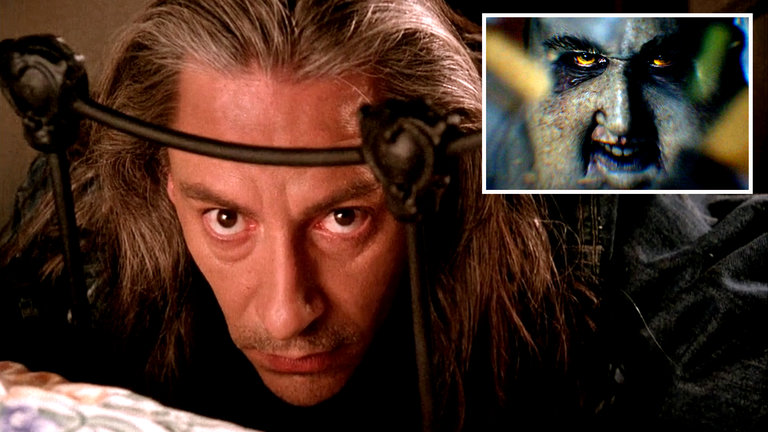
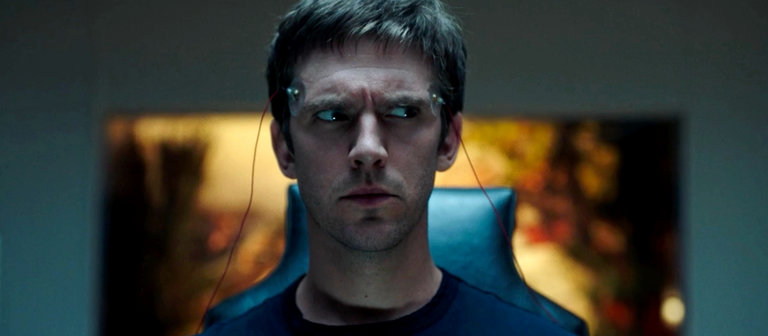
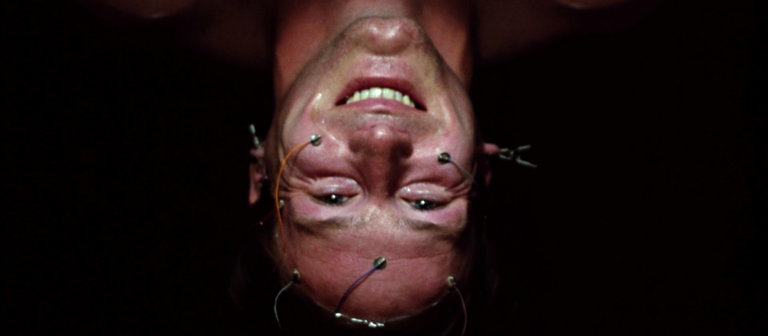
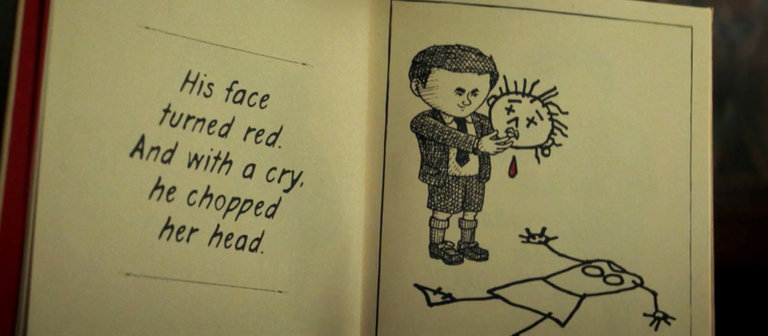
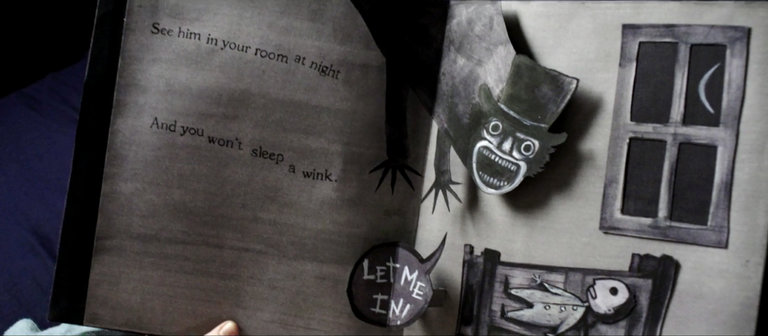
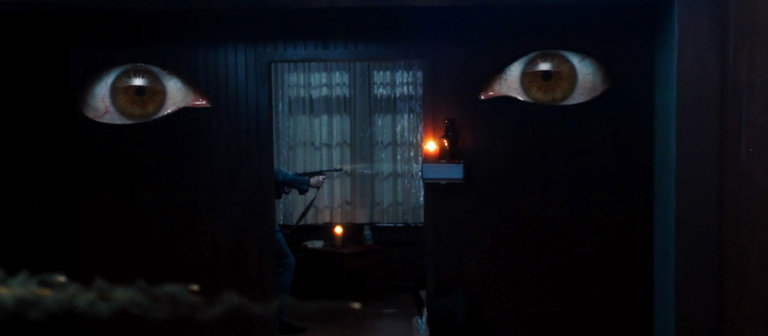
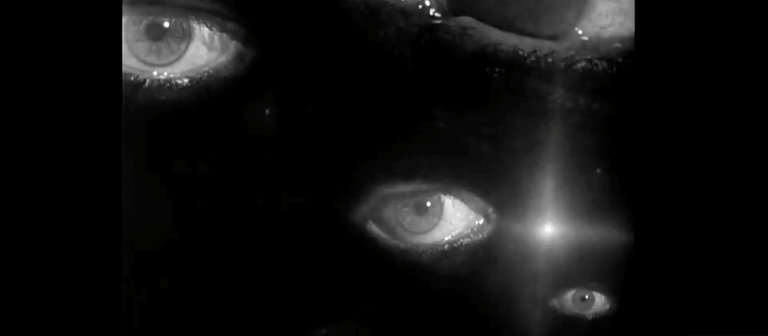
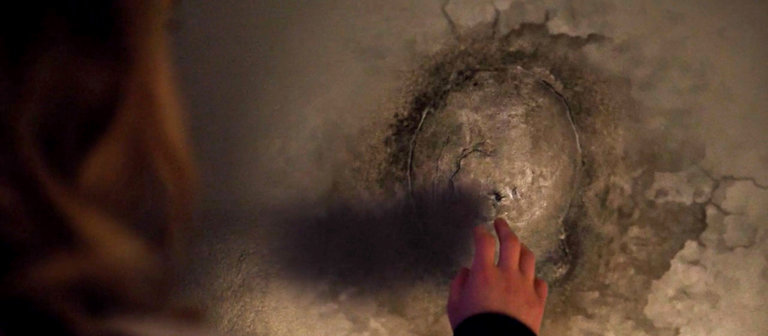
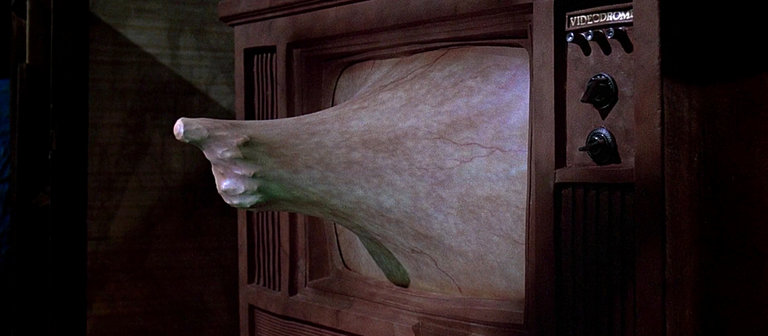
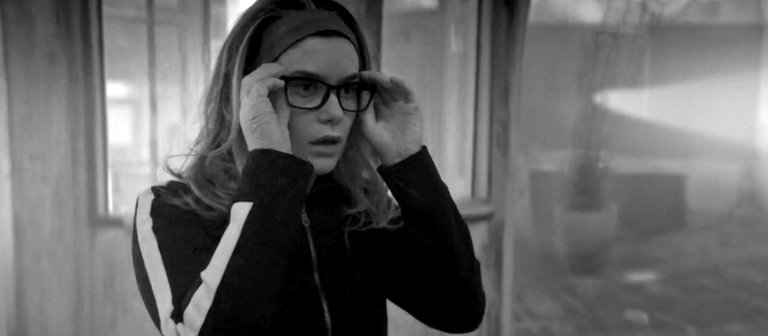

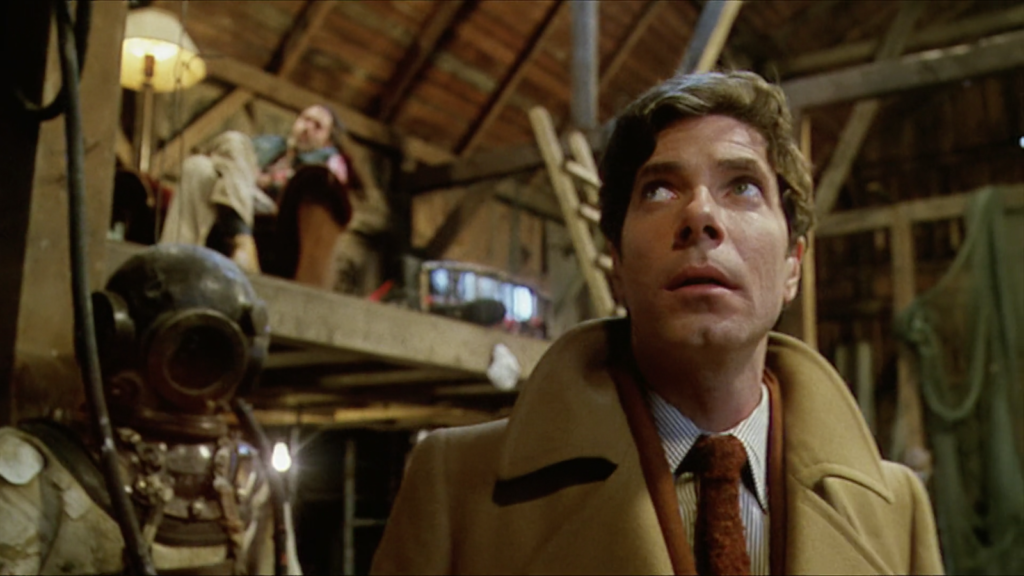
While Lynch gets the “Legion”-related headlines, another director named David seems to have left an even deeper mark. That would be David Cronenberg, who made a name for himself with a series of body-horror films that depicted the disturbing interplay between mind and matter, often with a conspiratorial backdrop of sinister secret agencies or killer corporations out to harness psychic power for their own ends.
“Legion” paints in shades of Cronenberg’s “Videodrome,” with its pulsating inanimate objects; “Shivers,” with its parasite imagery; “The Brood,” with its story of a powerful telepath under the care of a manipulative therapist (played by Oliver Reed, who may have lent both his name and his machismo to the guru figure Oliver Bird); and most especially “Scanners,” with its all-out war between rival psychic factions and a protagonist who’s telepathically tormented by the voices in his head. (“Scanners” also features a blink-and-you’ll-miss-it appearance from a very familiar-looking deep sea diver suit).
I wrote about David Cronenberg, David Lynch, and Legion’s other major horror influences for the New York Times. I have my beefs with Legion, but it’s porting its horror references into a whole different genre, as opposed to Stranger Things, which is just reheating them in the microwave and trying to pass of leftovers as a fresh-cooked dish.
“The Path” thoughts, Season Two, Episode 11: “Defiance”
March 29, 2017But all the business-y bullshit that everyone has to go through to get to any of these points — all the car rides and hallway lurkings and door knockings and arguments on the threshold — it’s just pure wasted space. As a practical matter it makes next to no sense in a world where phones exist. But more importantly, it posits a world in which human beings only interact with one each other for reasons of righteous indignation or naked duplicity. You go to someone’s house, you bully them or bullshit them, and you leave. It’s a lot like Eddie’s silly blindfolded needle-threading exercise — the focus is on getting everything where the story needs it to be rather than asking why it’s going there in the first place. For a show that’s ostensibly about the deep truths of human existence…well, I kinda want to pop into the writers’ room and tell them what’s going wrong.
I counted damn near a dozen Seinfeld-style “pop-ins” used to advance the plot of this week’s episode of The Path, which I reviewed for Decider. This is no way to write a show, man.
“The Americans” thoughts, Season Five, Episode Four: “What’s the Matter With Kansas?”
March 29, 2017I’m concerned about Renee. You know, Renee—Stan Beeman’s beautiful blonde gym buddy and new girlfriend, played by ex-Walking Dead lead Laurie Holden? The woman whose magnetism ate up a ton of Stan’s screentime through his descriptions of her to his buddy Philip Jennings and his partner Agent Aderholt alone, even before she made her on-screen debut? The woman who, during a double date with Stan and the Jennings, provides the kind of highly detailed backstory that we’ve learned from experience with our Soviet spies in this very episode (“What’s the Matter with Kansas?”) is just the sort of bubbe-meise secret agents concoct for their false identities? The woman who elicits weirdly stiff smiles from Philip and Elizabeth, implying that they sense something is off, but without the show ever confirming that implication by having the Jennings say something like “Wow, that was weird, wasn’t it?” during the car ride home or whatever? Yeah, that Renee. The beautiful thing about all this is that it all works no matter what pans out. Maybe we’re right to be suspicious and this person is up to no good—KGB, CIA, or some other alphabet agency seeking to compromise one of the FBI’s best and brightest. Or maybe our years-long immersion into the lives and lies of Philip, Elizabeth, Stan, Oleg et al have us jumping at shadows. Either way, you couldn’t ask for a finer demonstration of The Americans’ power to generate paranoia.
I reviewed this week’s oddly worrying episode of The Americans for the New York Observer.
“Billions” thoughts, Season Two, Episode Six: “Indian Four”
March 29, 2017Isn’t it nice to have a show that can legitimately outsmart you—not just bury some easter-egg clues in a storyline and wait for you to find them, but convincingly construct characters whose intellect, talent, and emotional acumen keep them several steps ahead of your own?
“Legion” thoughts, Season One, Episode Seven
March 24, 2017Fortunately for David, diagnosis is nine-tenths of the cure. Now that he knows the source of his sickness, he’s able to shake it off and break through the barriers of his mind. With a little help from his mutant friends, he shuts down the hospital hallucination they’ve all been experiencing, seizes control of his own body, subdues the Shadow King, stops the bullets fired at him and Syd mid-flight and lives to fight government mutant-hunters another day. Simple, really!
No, seriously. The real secret of “Legion” is that it is a simple story, when all is said and done. Unlike, say, “Westworld,” none of the show’s countless Easter eggs, deliberate details and plot-twist trickery are essential to understanding the story. They’re aesthetic elements, not narrative ones; they exist not to convert the show into a puzzle-box but to make it an objet d’art, successfully or not. The simplicity of David’s origin and of his nemesis, as revealed in this episode, should make that clear. (Even a passing knowledge of the Marvel comics upon which the show is based — in which the writer Chris Claremont established the founder of the X-Men, Professor Charles Xavier, as David’s father and cocreated Farouk as one of their most powerful enemies — would have made it clear to a sizable chunk of the audience already.)
But while this simplicity allows “Legion” to cut through the Gordian knot of needlessly byzantine plotting that has plagued other genre shows of recent vintage, the blade is double-edged. Lacking narrative necessity, the show’s stylistic flourishes are free to sink or swim on their own. By that standard, they too often hit bottom.
The climax of tonight’s episode is a case in point. It’s an all-roads-converge kind of deal, in which Syd and Kerry’s battle with Farouk’s alter ego Lenny in the hospital simulation; Cary, Melanie and Oliver’s struggle to shield Syd’s and David’s bodies from the bullets in the time-frozen real world; and David’s attempt to psychically shatter the doors of his mind-prison all sync up successfully at the last second, saving their skins and stopping the bad guys simultaneously.
But all that action should be enough to stand on its own without the cutesy context the filmmakers provide. What is gained by having the fight play out like a silent movie, shot in black and white with dialogue printed as intertitles and Lenny gussied up in Charlie Chaplin’s Little Tramp meets Johnny Depp’s Edward Scissorhands drag? Why is the musical accompaniment an EDM version of Ravel’s “Boléro”? Irony has its place in the frequently too portentous superhero subgenre, but here it undercuts the tension and terror without providing much compensatory value.
I reviewed this week’s penultimate episode of Legion for the New York Times. This show isn’t the worst thing on TV or anything like that, but at this point I am truly stunned that anyone thinks it’s great and am starting to mistrust critics who allege that it is.
“The Path” thoughts, Season Two, Episode Ten: “Restitution”
March 24, 2017This week on The Path, it’s Meyerist Yom Kippur. After meditating on their transgressions over the past year, the members of Doc’s movement write those they wish to relinquish down on a piece of paper and place in in a tiny wooden coffin they build and decorate for the occasion. They then take these coffins to the edge of an unnamed body of water and toss them in, as if consigning their sins to the depths.
Unfortunately, if you toss tiny floating wooden boxes into the shallow water of a lakeside beach, you’re not really gonna get rid of anything. So after the bulk of the group departs, a handful of Meyerists stay behind to—god, I feel stupider just typing this out—to fish the little coffins back out of the water and set them on fire. Which, again, is not a form of destruction to which they’d be amenable, since they’re made of wood that’s been soaking in a lake for a few hours.
Be that as it may! The real purpose of the sequence, and presumably the reason writer-creator Jessica Goldberg concocted the cockamamie “We cleanse our transgress so we can burn the sins of last year” two-phase ritual in the first place, is so Richard can get his hands on Sarah’s little coffin, open it, and uncover her transgression to use against her—which he does by providing it to Eddie, so he can learn she’s trying to stop feeling guilty for getting together with his rival Cal.
Again, I’d imagine that tiny pieces of paper folded up and placed inside a non-waterproof wooden container before getting chucked into the fishpond or whatever are not the most reliable sources of intel. But Eddie had to find out about Cal and Sarah somehow, so by god, the ritual is going to involve throwing dark secrets into the water and then retrieving them just to destroy them—except, in this particular case, just to save them instead.
Every so often a show provides you with a perfect encapsulation of all its strengths or all its faults; this needlessly convoluted and rickety ritual is The Path writ small. Like those little coffins, the show’s characters get tossed in one direction before getting yanked back in the other, then get pried open for big emotional revelations that make little sense.
I reviewed this week’s episode of The Path for Decider. This show, man.
“The Americans” thoughts, Season Five, Episode Three: “The Midges”
March 24, 2017“Why are we looking at this for so long? Ohhh, that’s why.” The Americans loves to set us up like this, drawing out scenes and storylines for as long as it can before pulling the trigger on our understanding of what the show is doing and why the show is doing it. “The Midges,” this week’s episode, features what’s bound to be one of the most talked-about examples of the technique yet. As KGB agent and reluctant CIA asset Oleg Burov exits the Soviet supermarket he’s investigating for corruption, the camera follows him through the aisles for a while but eventually allows him to exit the store alone. While he leaves, it stays behind, watching the shoppers browse the sparse shelves. Most prominent in the frame is a woman in a headscarf, one of many in the store. But the shot lasts too long for her to be just another extra. Is she a spy sent by the US or the USSR to keep tabs on Oleg? Is she about to do something unusual or unpleasant, or is something unusual or unpleasant about to be done to her? Wait—is she…familiar looking? Her face turns toward the camera just as the scene’s focus on her becomes impossible to ignore. Behold: Martha, Philip’s wife and asset and victim, going about her new life in the country that took away her old one. “Is it hard, pretending to be other people?” Paige asks her parents elsewhere in the episode. Philip tells her yes, it is. Martha could no doubt do the same.
I reviewed this week’s typically strong episode of The Americans for the New York Observer.
“Billions” thoughts, Season Two, Episode Five: “Currency”
March 20, 2017We open with Johnny Cash on the soundtrack, as Mike “Wags” Wagner, the most Billions character on Billions, pours his heart out to his liege lord Bobby Axelrod and getting screamed at in response. No, wait—a “48 HOURS EARLIER” chyron reveals that we’re opening, with Johnny Cash on the soundtrack, in South Korea, where some poor schmoe involved in the manufacture of some obviously faulty smartphone takes a header out his hotel window, cutting off the music and setting off a soft “thud” and the sounds of screeching cars and screaming pedestrians below. We cut to Mafee, one of Axe Captial’s mid-rung hedgebros, running headlong into Bobby’s office only to find him absent. We cut to where Bobby is: at a racetrack with his kid and Frenchy from Goodfellas, where he’s tring to get a line on the locale of an upstate New York casino that’s in the works until word about the smartphone debacle reaches him. And from there, it really is off to the races.
“Currency,” the fifth episode of Billions’ shockingly good second season, is as ruthlessly efficient a storytelling machine as its predecessors. There’s not a plot beat that doesn’t reveal character, and there’s not a character revelation that doesn’t advance the plot. Guest stars—from the aforementioned Mike “Frenchy” Starr, to Dennis Boutsikaris, Danny Strong, and Jerry O’Connell as recurring rival hedge fund gurus turned potential allies, to Ritchie Coster of True Detective Season Two doing a sort of Mayor Chessani redux as a gambling-industry hotshot, to Mad Men villain Allan “Lou Avery” Havey as the boss of Christopher Denham’s superlative rat-squad investigator Oliver Dake—shine. Leading players get some of their strongest moments, from Bobby ripping up Lara’s ambitions out of pique to Chuck admitting to Wendy that he’s always felt like she was out of his league—a confession she was utterly flummoxed to hear, which illustrates how strained their relationship really was. Jokes hit hard as well: cf. Bobby asking his hapless underling Mafee, who has a major tipoff but is afraid to divulge it, “Are you transmitting the details to me telepathically?”; Chuck asking his more competent subordinate Kate if she’s ever gone hunting and her replying “No—I’m black”; Chuck asking Go enthusiast Bryan Connerty if he takes a vow of celibacy to adhere to the game’s ancient roots and Bryan responding “No, that’s just the end result”; brash psychotherapist Dr. Gus barking at his boss Bobby to “Let me into that kitchen!”
All of this is in service to some of the tightest plotting on television.
Billions is so good right now. I reviewed last night’s super-taut episode for the New York Observer. Pay special attention to the structural sharp left turn it makes near the end of the episode — that’s damn strong writing.
“Legion” thoughts, Season One, Episode Six
March 20, 2017Yet for all its intelligent design, the episode still feels as stuck in limbo as its characters. At no point are we in any doubt as to the nature of the situation: The devil with the yellow eyes has used David’s telepathic brain to construct a mental prison for him and his friends. We know they’re not crazy. We know their therapist is really their captor. We know the asylum in which they’ve been stowed is a simulacrum of the one David escaped in the pilot. We even know some of the dialogue they’re speaking, since it’s a deliberate repeat from scenes in that first episode. The only mystery is how they’ll break free, and since there are two episodes to go, that they will break free is a given. So it doesn’t take long for the novelty to wear off — and for the same weightless unreality that a dimly cognizant Syd complains to Dr. Busker about to begin taking hold of the viewer as well. Given the momentum the show had built as David gained control of his powers and then had them violently seized by his nemesis, devoting a full episode to this sense of stasis is a real shame.
It could be worse, however, at least if the ways in which the show really cuts loose in this episode are any indication. In a gravely miscalculated musical interlude, the devil-Lenny cavorts around David’s memories in a leotard and fishnets to the tune of Nina Simone’s “Feeling Good.” The song’s recent fate as a weight-loss jingle was bad enough, but to see it reduced to the soundtrack for a psychic parasite’s bump-and-grind — occasionally shot in silhouette against monochromatic red, like a James Bond title sequence — is somehow even more dispiriting, doubly so given the showrunner Noah Hawley’s impeccable use of found music in his other FX vehicle, “Fargo.” Like the easy allegory of the entire asylum-limbo story line, it’s a case of infatuation with form impeding function.
I reviewed last week’s Legion for the New York Times. More on this show soon.
